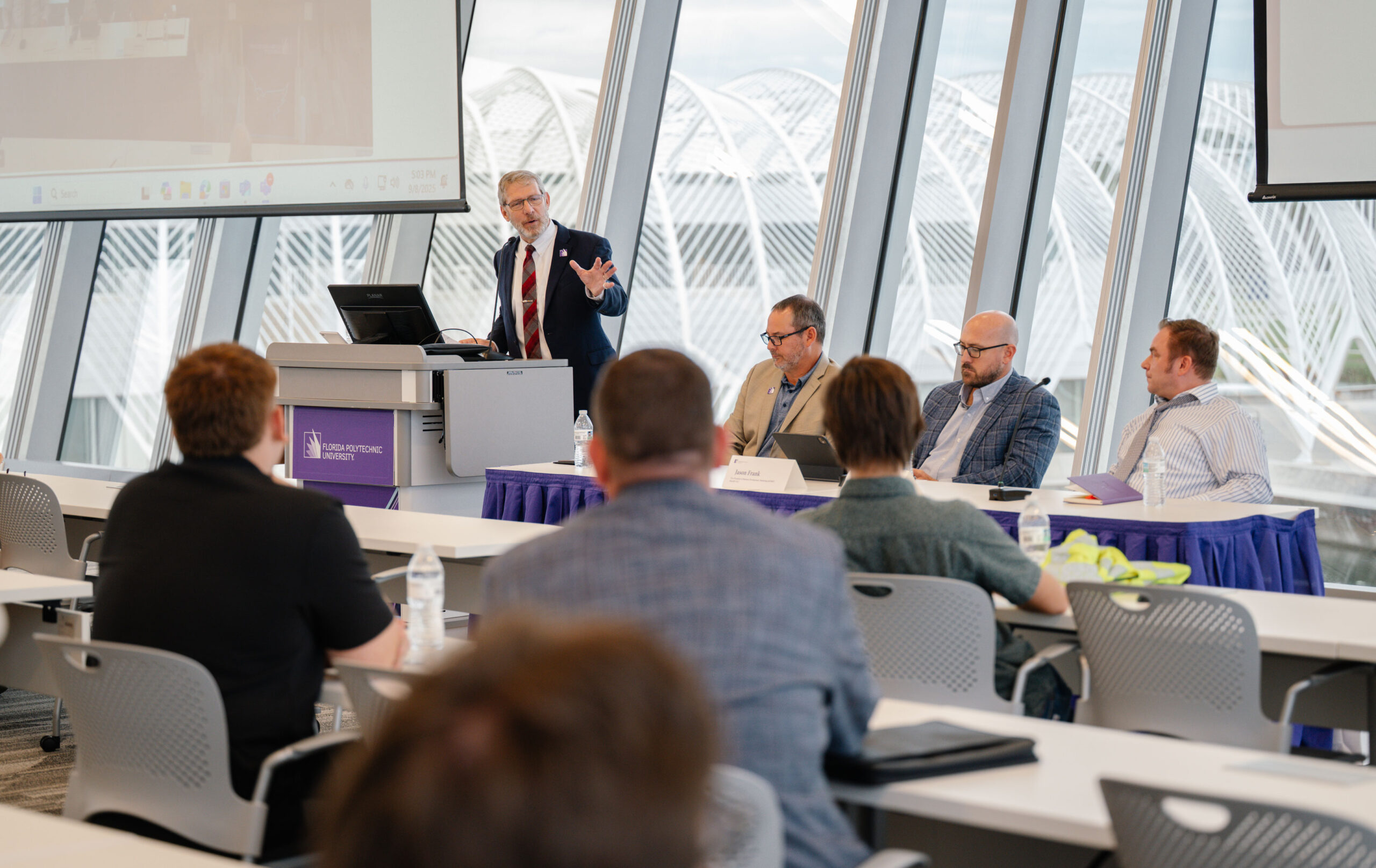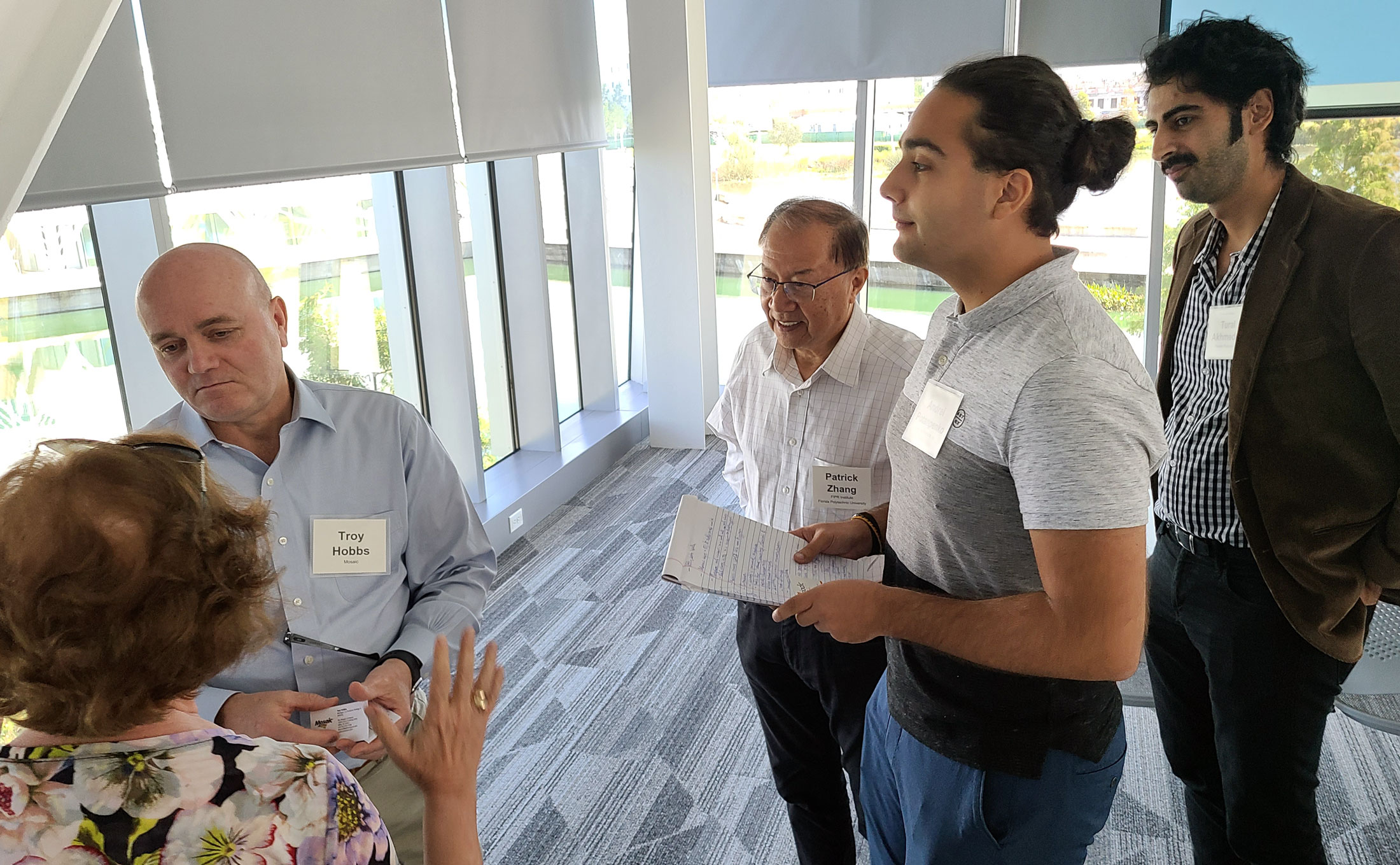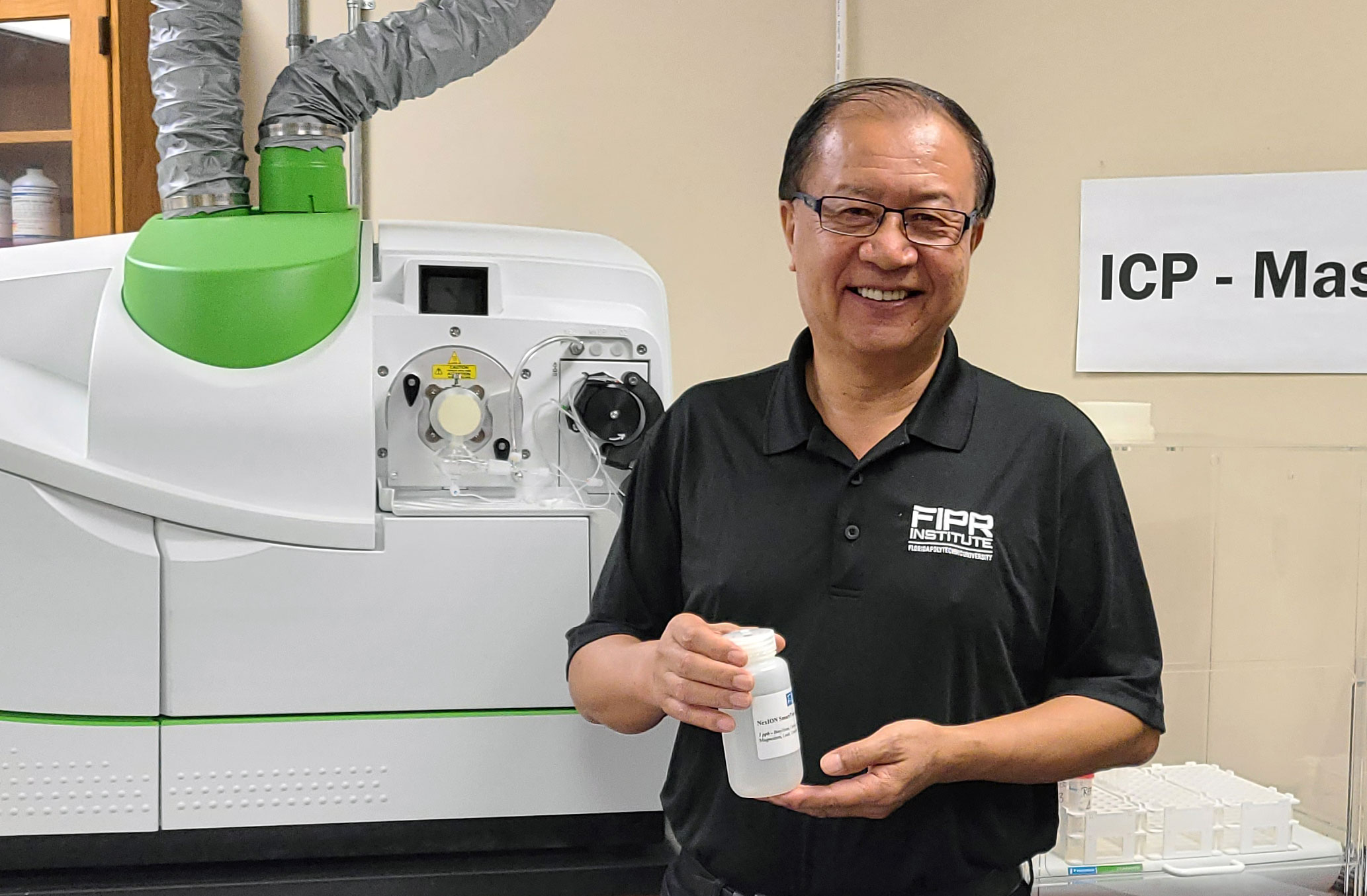Florida Industrial & Phosphate Research Institute
Advancing Innovation in Phosphate Research & Environmental Stewardship
The Florida Industrial and Phosphate Research Institute (FIPR Institute) at Florida Poly is a globally recognized research hub driving innovation in phosphate mining, environmental sustainability, and public health. Located in the heart of Florida’s phosphate-producing region, the Institute serves as a crucial link between academia, industry, and government, shaping the future of one of Florida’s most important natural resource sectors.
About the FIPR Institute
Established by the Florida Legislature, the FIPR Institute is a state-supported research organization dedicated to:
- Enhancing the efficiency and sustainability of phosphate mining and processing.
- Addressing environmental, engineering, and health concerns related to phosphate operations.
- Supporting Florida’s economy through innovation, education, and collaboration.
The Institute operates under the guidance of the Phosphate Research and Activities Board, ensuring strategic oversight and alignment with state and industry priorities. The role and structure of the Institute are defined in Florida Statute 1004.346.
Read Our Annual Reports
Annual Report for Fiscal Year 2022-2023
Annual Report for Fiscal Year 2020-21
Annual Report for Fiscal Year 2018-19
Annual Report for Fiscal Year 2017-18
Annual Report for Fiscal Year 2016-17
Annual Report for Fiscal Year 2015-16
Annual Report for Fiscal Year 2014-15
Annual Report for Fiscal Year 2013-14
Annual Report for Fiscal Year 2012-13
Annual Report for Fiscal Year 2010-11
Notice of Public Meeting
Information regarding upcoming Research and Activities Board meetings related to the operation of the FIPR Institute will be posted here as scheduled.
Core Research Areas
At the FIPR Institute, research is mission-driven and solution-focused across five core areas of phosphate science and environmental stewardship. Select each section below to learn more about our ongoing initiatives.
Mining & Beneficiation (Mineral Processing)
FIPR Institute research in mining and beneficiation focuses on enhancing the efficiency, sustainability, and environmental performance of extracting and processing phosphate ore.
Research Topics Include:
- Mining practices, pipeline systems, and matrix transport
- Online sensors for phosphate analysis
- Land use evaluation and planning
- Dolomite separation and flotation efficiency
- Dewatering of phosphatic clays and process control technologies
Key Challenges Addressed:
- High dolomite content in southern Florida ores, which complicates phosphoric acid production
- Reducing chemical reagents used in the flotation process
- Managing clay settling areas, which cover over 100,000 acres and present significant environmental and land use challenges
FIPR research aims to shorten clay crusting time, make reclaimed land more usable, and overcome permitting challenges by addressing community concerns about long-term land impact.
Chemical Processing & Phosphogypsum
This area investigates the chemical transformation of phosphate rock into fertilizer products and the management of phosphogypsum—a significant by-product of this process.
Research Topics Include:
- Engineering properties and potential reuse of phosphogypsum
- Environmental impact assessments and dust control
- Process improvements for phosphoric acid production
Phosphogypsum Reuse Opportunities:
- Road base material
- Agricultural soil amendment
- Sulfur recovery
- Construction material
- Landfill cover that enhances decomposition
Regulatory Context:
Due to EPA regulations, phosphogypsum is stored in stacks, with large volumes of acidic process water. FIPR research informs ongoing discussions with the EPA to explore beneficial reuse while minimizing risks.
Environmental Engineering
The Environmental Engineering research area at the FIPR Institute focuses on minimizing the environmental impact of phosphate mining and chemical processing operations. This area of research plays a critical role in advancing sustainable practices, regulatory compliance, and public trust.
Research Topics Include:
- Surface water and groundwater modeling
- Water treatment and reuse technologies
- Management of process water and stormwater
- Stabilization of phosphogypsum stacks and clay settling areas
- Air quality monitoring and dust control
- Sustainable tailings and waste management solutions
Purpose and Impact:
FIPR’s Environmental Engineering initiatives aim to protect Florida’s natural resources while enabling continued innovation in phosphate-related industries. By combining engineering expertise with environmental science, the Institute develops practical solutions that address real-world challenges, such as nutrient runoff, sediment control, and the design of more efficient water management systems.
Ongoing Efforts:
- Improving the integrity and safety of waste storage systems
- Designing environmentally responsible infrastructure for new mining sites
- Supporting permitting processes through scientific modeling and impact studies
FIPR’s environmental engineering research ensures that industry growth does not come at the expense of Florida’s ecosystems—supporting both environmental stewardship and economic resilience.
Remediation & Reclamation
FIPR supports research that helps restore land impacted by phosphate mining to a productive or ecologically balanced condition—often exceeding legal requirements.
Research Topics Include:
- Reclaiming wetlands, uplands, scrub habitats, and lakes
- Studying wildlife, vegetation, hydrology, and soils
- Economical closure of phosphogypsum stacks
- Agricultural reuse of reclaimed lands
Evolving Focus Areas:
- Restoring ecological systems and hydrologic balance
- Assessing the impact of clay settling areas on water quality
- Improving habitat development and minimizing artificial maintenance
- Long-term tracking of reclaimed land performance
FIPR also regularly hosts symposiums and conferences on reclamation science.
Environmental Health
FIPR is committed to research that protects both public health and the natural environment. This includes evaluating risks from mining-related processes and exploring ways to mitigate exposure to harmful substances.
Research Topics Include:
- Radon surveys and radon-resistant construction
- Worker health, radiation exposure, and public safety
- Dust, aerosol, sulfuric acid mist, and noise pollution
- Water contamination from fluoride, heavy metals, and acids
- Safety of consuming fish from reclaimed lakes
Future Research Focus:
- Monitoring environmental effects of new technologies
- Conducting baseline studies before new sites are mined
- Supporting public education on environmental safety
Environmental Health research plays a key role in ensuring that all phosphate-related innovations meet or exceed safety standards for Floridians and the ecosystems they depend on.
Laboratory & Consulting Services
The FIPR Institute offers expert laboratory analysis and technical consulting for the phosphate industry, related mineral sectors, and applied industrial research. Backed by four decades of applied science and in-house capabilities, our services are trusted by industry leaders, researchers, and policymakers.
Laboratory Services
Our state-of-the-art laboratories are equipped to support a wide range of analytical, mineral processing, and biological studies. Services are offered on a contractual basis, with strict confidentiality protocols available for sensitive projects.
Our lab facilities include:
- Analytical Chemistry Lab – wet bench chemistry room and advanced analytical instrumentation
- Metallurgical Lab – includes secure outdoor compound for material processing
- Biological Lab & Greenhouse – supports herbicide susceptibility testing and plant research
Analytical Capabilities:
- Sample preparation (crushing, grinding, drying, sieving)
- ICP-OES and ICP-MS (Perkin Elmer systems)
- X-ray diffraction and P₂O₅ / CaO analysis
- pH/ISE measurements and centrifugation
- Magnetic, electrostatic, sonic, and heavy mineral separations
Special Procedures & Quality Control:
- AFPC-compliant chemical analysis with certified standards and controls
- Class A glassware, ACS-grade reagents, and routine quality checks
- Specialized testing for uranium, rare earth elements, and other select analytes
Our laboratory services are designed to deliver accurate, reliable, and scientifically validated results to support both research and commercial goals.
Consulting Services
With more than 40 years of expertise in phosphate and industrial mineral research, FIPR’s consulting team provides data-driven insights and technical guidance for a wide range of applications.
Consulting Expertise Includes:
- Florida and global phosphate market and regulatory issues
- Mining and beneficiation (mineral processing)
- Chemical processing and phosphogypsum management
- Flotation and mineral separation techniques
- Land reclamation for terrestrial and aquatic systems
- Sulfur recovery and waste minimization strategies
- Dewatering, clay/fines consolidation, and energy-related byproducts
FIPR Institute consultants work collaboratively with industry leaders, government agencies, and research institutions to solve complex challenges and advance innovation across the phosphate sector.
Library & Publications
As a leading source of phosphate-related knowledge, the FIPR Institute maintains a robust technical library and publishes research findings to advance scientific dialogue.
Library Access & Services
Access to the FIPR Library is available through the Florida Polytechnic University Library. Requests for materials or information may also be submitted online or by phone.
Lending & Check-Out
- Materials may be checked out in person at the FIPR Institute Library at 1855 West Main Street, Bartow, FL 33830
- Available to Florida residents and anyone with borrowing privileges through Florida Polytechnic University
- Loan period: up to 3 weeks with potential renewals (unless on hold by another patron)
- Renewals and holds can be requested in person, by phone (863) 583-9094, or through the Library Contact Form
Interlibrary Loan
Can’t visit in person? Library materials may be requested through your local library’s interlibrary loan (ILL) system. FIPR can also borrow from most libraries across the U.S. Note: Lending institutions may charge a fee, which will be passed on to the requesting user.
Publications
The Library also serves as the official clearinghouse for all FIPR Institute research publications, including those produced by its predecessor organization. All reports are available as downloadable PDFs.
These resources cover a wide range of topics related to phosphate mining, processing, environmental management, and industrial applications—supporting researchers, policymakers, and industry professionals alike.
News & Impact
The FIPR Institute regularly contributes to advancements across the phosphate industry and environmental sciences. Here are a few notable highlights:

Expert panel explores phosphate mining and its impacts
A panel discussion at Florida Polytechnic University on Monday, Sept. 8, examined the history, benefits and future of phosphate mining.

National workshop at Florida Poly unveils advances on rare earth element extraction
Research scientists and industry leaders from across the country converged at Florida Polytechnic University to learn about research in the area of rare earth element (REE) extraction at the CMI 2023 Phosphate Workshop. The Florida Poly-hosted event, which took place at the Applied Research Center on campus, focused on progress in extracting REEs from phosphoric Acid Sludge, or the byproduct

FIPR secures $150K grant to create U.S. source of critical rare earth elements
The production of computers, solar panels, smartphones, electric cars, and more all rely on a steady supply of rare earth elements. China currently supplies most of the world’s rare earth elements, but a new Department of Energy grant awarded to Florida Polytechnic University’s Florida Industrial and Phosphate Research Institute (FIPR) aims to change that. FIPR has received $150,000 grant from
Connect With Us
Whether you’re a student, researcher, industry partner, or community member, we welcome your interest and engagement. Florida Poly is proud to partner with the FIPR Institute to advance STEM research, environmental stewardship, and the future of Florida’s phosphate industry.


